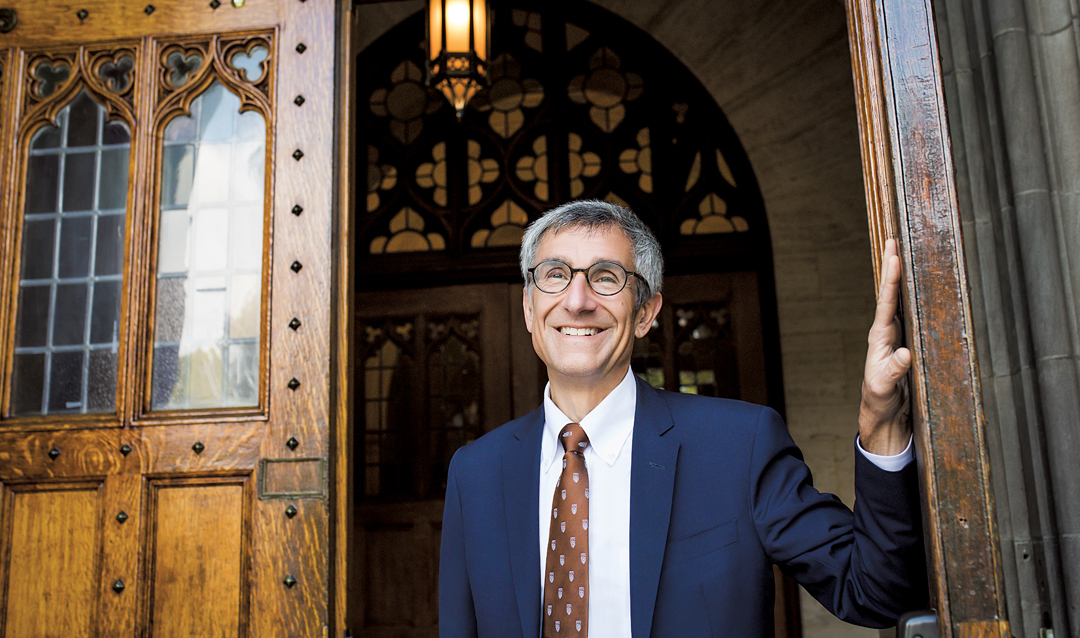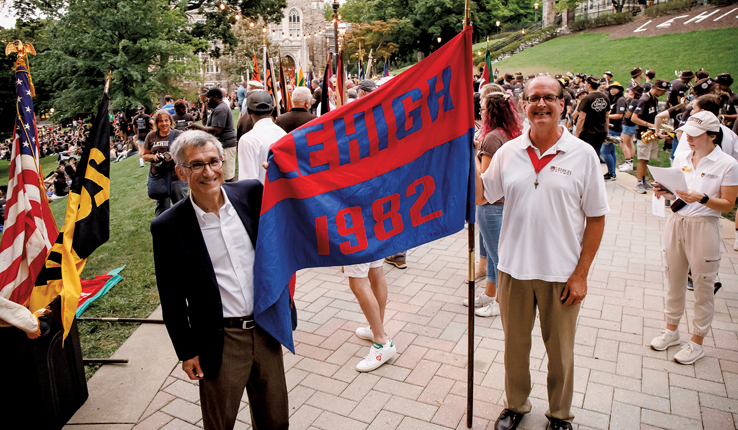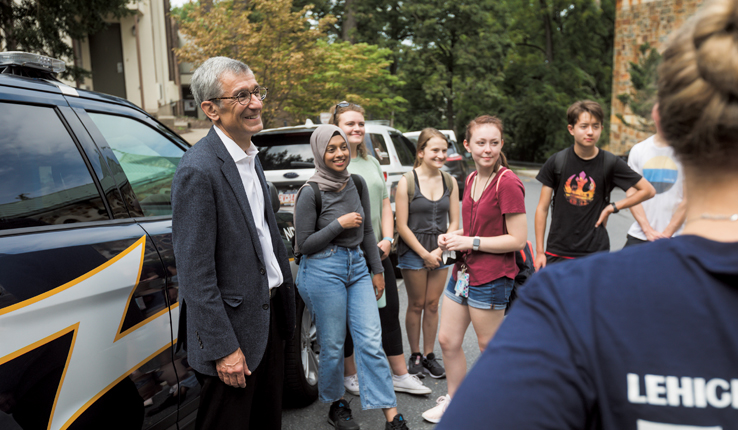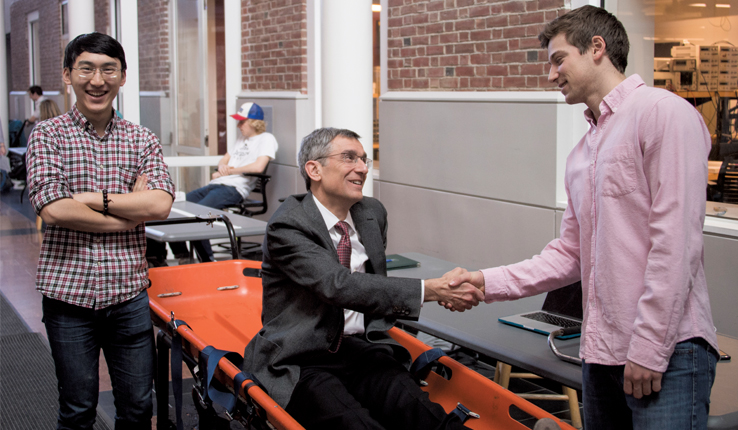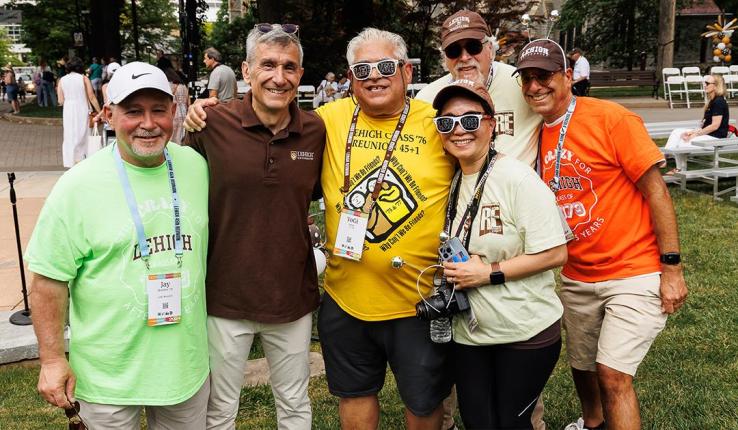At home, education was paramount. “There was never any question that I and my two younger sisters would go to college,” Helble says. “It was just assumed.” Helble worked summer jobs and set aside money for his future. His family stopped going on vacations and eating at restaurants in an effort to save money for the children’s college education.
“It was just clear through every decision my parents made that education was a way to secure a place in the middle class and be a contributing member of your community,” he says.
Helble looked for a college that was not too far from home. He was interested in the sciences and engineering, and Lehigh had a strong reputation in those fields. That was the analytical part that figured into his decision. But he felt an emotional pull too, given the beauty of the campus, and he says, breaking into a grin, the palpable enthusiasm of a campus tour guide.
Now back on the Lehigh campus, the memories have come flooding back—walking out of the (now) Clayton University Center after learning, to his delight, that he had been selected as a Gryphon, walking across campus with friends on his way to classes, running the “miserably hard” course up and over South Mountain as part of cross-country practices, attending challenging labs and sharing the experiences with classmates.
Helble gets a bit choked up as he remembers his conversations with the Lehigh faculty who encouraged him and pushed him to aim high. “It opened up a world of possibilities for me that I didn’t even know existed,” he says. He figured he’d attend his classes, graduate, get a job in an industry in New Jersey—“all of which would have been fine,” he says. “But they sat down with me and said, ‘You can do that, if that’s what you want. Here are all these other possibilities that we see for you. Have you thought about this?’ And I hadn’t.”
In his first week as Lehigh president, Helble attended the orientation for new graduate students in Neville Hall. He looked around the auditorium and said to the students, “I’ve not set foot in this room since I was here for organic chemistry.” (Which, by the way, he loved.)
“So it feels very familiar,” he says, “and it feels like home.”
A Purposeful Career
Helble was very intentional in choosing chemical engineering as his major at Lehigh at the end of his first year as an undergraduate. For one, he loved chemistry. But what was important to him, he says, was its application in addressing looming energy problems in the environment.
The 1979 OPEC oil crisis, caused by a drop in oil production in the wake of the Iranian Revolution, had led to a spike in oil prices, fuel shortages and long lines at gas stations. The disruption in people’s lives had drawn attention to the country’s energy supply.
Also, the 1979 nuclear accident at Three Mile Island in Middletown, Pennsylvania, just 96 miles from the Lehigh campus, fueled fears about the safety of nuclear energy. “That had me thinking about energy in a much more immediate and visceral way,” he says.
A runner since high school, Helble always appreciated the outdoors too. He was aware of air quality issues that then still stemmed from the operations of the nearby Bethlehem Steel Corp., as well as from the unfiltered exhausts of diesel buses that passed along the city streets.
“And so talking to faculty and just doing a little reading, it was clear to me that if I wanted to dedicate my career toward working on problems that I cared about in this area, chemical engineering was the path to pursue,” Helble says.
At the time, climate change was not in the forefront of the public consciousness. Helble says he thought much more about the visible problems of air pollution, such as sulfur, nitrogen oxides, soot and particulate matter, and devoted a large part of his research career to those areas.
“But over time,” Helble says, “I started working on questions of CO2 capture, because it was becoming clear by the ’90s, the modeling was more and more consistent, that this was a looming crisis that we were facing. And I’m a realist. I didn’t think the world would be able to turn a switch at any point in time and stop utilizing fossil fuels. I still don’t think that’s possible today … My view then and now was, in addition to pursuing alternatives, we have to think about developing materials and technologies to take CO2 out of the air.”
Helble’s research interests have led him to author more than 100 publications. He also has three patents related to the production of nanoscale powders.
At MIT, Helble minored in Spanish as he worked toward his Ph.D. in chemical engineering. While Ph.D. students were required to have a minor, his advisor had wanted him to consider another branch of engineering or materials science instead. Helble persevered, assuring his advisor that he would still take additional classes in those areas.
By minoring in Spanish, Helble says, he was able to gain insight into a different culture, as well as engage a different part of his mind. “It’s just a different way of thinking in the humanities, compared to the analytical approach that you would take in math or science,” he says, “and I enjoyed that.”


